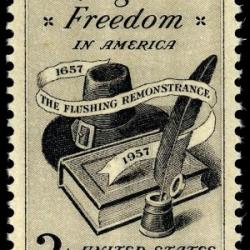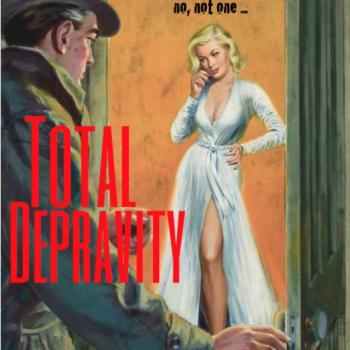Eric Adams seems to think he’s the mayor of New Amsterdam rather than of New York City.
That’s giving too much credit to the thought behind Mayor Adams’ recent remarks at the city’s annual interfaith breakfast, where he … well, condemned religious pluralism.
I don’t think Adams realized that’s what he was doing with his enthusiastic call for religious establishment. I suspect he was just trying to deploy some pious rhetoric at a religious gathering by repeating some of the stock phrases he’d heard in his non-denominational Pentecostal church. But his remarks there sounded more like something from Dutch colonial governor Peter Stuyvesant than like anything one should expect from the mayor of New York.
“Don’t tell me about no separation of church and state,” Adams said at the interfaith breakfast. “State is the body, church is the heart. You take the heart out of the body, the body dies.”
He also lamented the end of state-mandated, state-composed official prayers in public schools. “When we took prayers out of schools, guns came into schools.”
It didn’t help that he was introduced by his chief adviser, Ingrid Lewis-Martin, a Pentecostal chaplain, who brought him to the podium by saying, “We know in government, many times, it is said that one has to separate church from state, but we have an administration that doesn’t believe in that. We have a mayor … who is definitely one of the chosen.”
The New Amsterdam governor would’ve said “elect” rather than “chosen,” but apart from that this was pure Stuyvesant.
Peg-leg Pete understood what this meant more clearly than Adams and Lewis-Martin do. Stuyvesant understood that the union of church and state was not an abstraction, but something that requires that the “heart” of the state be an actual, particular church — one sect and not any other. You can’t just decree abstract “prayer” in schools, but have to decree which prayers, from which sect, to allow, and which prayers from which sects (all the others) to forbid.
This is why Stuyvesant was intent on barring Jews, Quakers, and Catholics from New Amsterdam. But it’s also why he was determined to also ban Lutherans and Presbyterians. He made it illegal for Lutherans to worship in the city and justified the prohibition by noting that these impious “heretics and fanatics” did not even attend church.
The people of New Amsterdam pondered the ironclad logic of Stuyvesant’s union of church and state and decided they didn’t like it. They wrote him a formal letter telling him what he could do with his religious establishment. The language of the Flushing Remonstrance is very 1657, but the gist of it — live and let live — is very New York:
You have been pleased to send unto us a certain prohibition or command that we should not receive or entertain any of those people called Quakers because they are supposed to be, by some, seducers of the people. For our part we cannot condemn them in this case, neither can we stretch out our hands against them. …
Wee desire therefore in this case not to judge least we be judged, neither to condemn least we be condemned, but rather let every man stand or fall to his own Master. Wee are bounde by the law to do good unto all men, especially to those of the household of faith. And though for the present we seem to be unsensible for the law and the Law giver, yet when death and the Law assault us, if wee have our advocate to seeke, who shall plead for us in this case of conscience betwixt God and our own souls; the powers of this world can neither attach us, neither excuse us, for if God justifye who can condemn and if God condemn there is none can justifye.
… The law of love, peace and liberty in the states extending to Jews, Turks and Egyptians, as they are considered sons of Adam, which is the glory of the outward state of Holland, soe love, peace and liberty, extending to all in Christ Jesus, condemns hatred, war and bondage. And because our Saviour sayeth it is impossible but that offences will come, but woe unto him by whom they cometh, our desire is not to offend one of his little ones, in whatsoever form, name or title hee appears in, whether Presbyterian, Independent, Baptist or Quaker, but shall be glad to see anything of God in any of them, desiring to doe unto all men as we desire all men should doe unto us, which is the true law both of Church and State; for our Saviour sayeth this is the law and the prophets. Therefore if any of these said persons come in love unto us, we cannot in conscience lay violent hands upon them, but give them free egresse and regresse unto our Town, and houses, as God shall persuade our consciences, for we are bounde by the law of God and man to doe good unto all men and evil to noe man.
Stuyvesant rejected the letter, continuing to threaten anyone who welcomed infidels and declaring a mandatory, colony-wide “Day of Prayer for the purpose of repenting from the sin of religious tolerance.”
That’s why when the British navy showed up seven years later, nobody in New Amsterdam listened to Stuyvesant’s call to defend the colony. He was forced to surrender and, in 1664, the name of the city was officially changed to New York.
If you ask me, though, that change had already happened back in 1657 when New Yorkers invented New York City by writing that Remonstrance welcoming Quakers, Jews, Turks, Egyptians, Presbyterians, Independents, Baptists, and any other children of Adam to come live and work beside them. That’s when New York became New York.
Now someone just needs to explain that to the city’s new mayor.
NB: The title of this post comes from Jimmy Kennedy and Nat Simon’s 1953 song “Istanbul (Not Constantinople),” best known today thanks to this fine rendition by They Might Be Giants:
The history and changing identity of the city of Istanbul/Constantinople is something else Mayor Adams might want to review as an antidote to his glib understanding of religious establishment.













